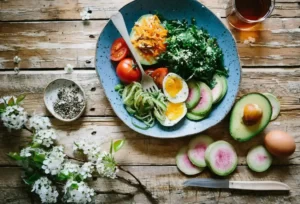
When talking about the cancer risk we usually imagine the role of a healthy diet as a superpower and believe that it can magically save us from hard diseases. This is true from the point, that while seeking to reduce the risk of developing cancer, diet can be controlled and chosen according to our needs or preferences, while some factors cannot, e. g. inherited genetic mutations.
But on the whole, is it ever possible to discover a healthy, balanced diet that could reduce the risk of cancer?
We have all probably heard that broccoli, pomegranates, or chia seeds are called superfoods, while food additives and sweeteners are called cancer-causing agents. Such narratives are lacking evidence. Scientific research does not reveal that broccoli or pomegranate alone will protect us from cancer. The basic food in our cupboards can hold the key to improving our health.
Diet is an Important Part of Our Daily Routine
Our diet routine is important to the point that it can help us keep a healthy weight or encourage losing weight. Of course, we should not forget that diet for cancer prevention must be combined with physical activity and a balanced daily routine (sleeping, relaxation, stress control, refusing bad habits such as smoking or alcohol abuse, etc.), seeking to keep a strong immune system.
Many kinds of research showed that obesity is the cause of more than 13 types of cancer so it is worth knowing the basic principles of healthy nutrition.
What food and drinks can cause cancer?
It is estimated that up to 30% of cancer cases are caused by our daily habits and nutrition. Although it is difficult to determine exactly which nutrients contribute the most to cancer development, today’s scientific research helps get a clearer picture of the general food product types that may increase this risk. For example, abundant consumption of salt and extremely salty food increases the risk of stomach cancer because salt damages the stomach walls and lining.
What about meat and cancer?
According to scientists, certain chemicals that are found in fresh red and processed meat, increase the risk of cancer. It has been observed that individuals consuming high amounts of red or processed meats are more likely to develop bowel cancer. Certain chemicals are specific to raw meat, and others occur on the meat during cooking. Red meat is fresh, ground, or frozen beef, pork, lamb, veal, and other types of meat. Processed meat is smoked or salted ham, sausage, salami, sausages, canned pork, corned beef, blood or liver sausage, pate, and canned meat.
On the whole, you can lower the risk of developing cancer by reducing red and processed meat, alcohol intake and moderating sugar intake.
Cancer prevention diet recommendations
We should realize that no one diet can guarantee that we won’t get cancer. But choosing a healthy, balanced diet can reduce the risk. What we all can do, is just consider these simple steps toward healthy nutrition:
- Once a week take a break from meat
- Choose fruits or raw nuts as snacks
- Eat vegetables of various colours
- It’s not necessary to eat only fresh fruits, vegetables, or beans – frozen or canned goods fit perfectly too for use
- Choose a healthier source of protein, e.g. replace processed red meat with fresh chicken, fish, or beans
- Choose water instead of sugary or alcoholic drinks
- Fill half of your plate with various vegetables
- Devote a quarter of your plate to high-fibre whole grains, such as brown rice or whole-wheat pasta
- The remaining quarter of the plate should be dedicated to protein-rich foods such as fish, fresh chicken, or vegetables such as beans or lentils
Scientists revealed that nutrition rich in fibre protects against bowel cancer because they improve defecation and shorten food digestion time. This prevents the development of cancer. Research shows that daily consumption of fibre food, e.g. more than 10 g, can lower the risk of colorectal cancer by 10%.










Comments
Thank you. Comment sent for approval.
Something is wrong, try again later